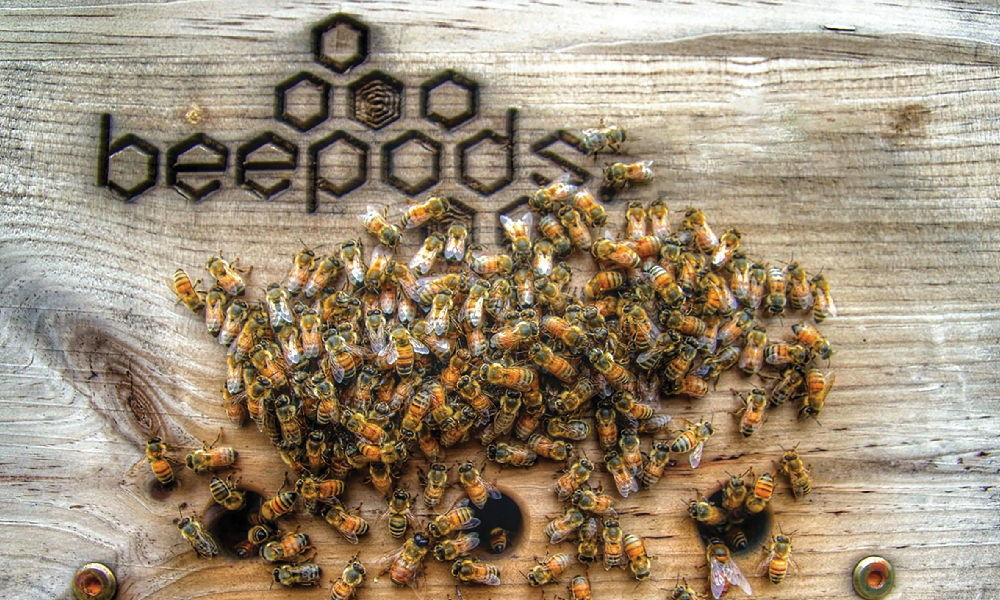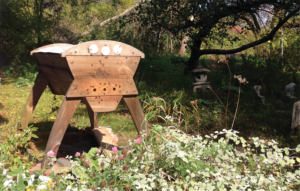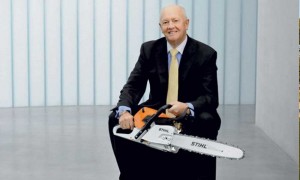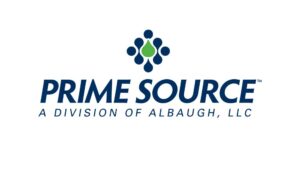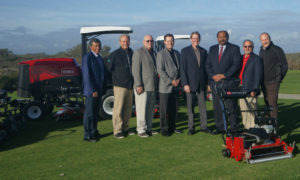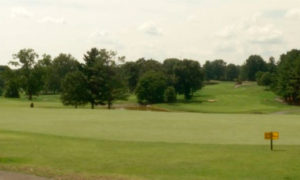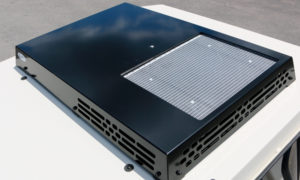When talking with golf course superintendents, you rarely need to address the subject of why bees and golf courses pair together so well. Beyond the occasional question about bee stings, superintendents immediately embrace the value of bees for pollinating plants and flowers in landscaped or naturalized areas around the course.
Go ahead and call those little guys buzzworthy. Bees are an intriguing topic for building community engagement and relationships.
From the maintenance crew to the director of golf, the staff and management of a golf course recognize that bees attract positive attention from club members, golfers, employees, and residents in nearby neighborhoods. And nothing delivers a stronger best practices testimonial to the judicious and responsible application of chemicals than the presence of thriving bee colonies.
Yet honeybees, credited with directly or indirectly pollinating between thirty-five and seventy-five percent of the foods we eat, are in big trouble. Last July, ABC News described the situation in the U.S. as a “rapid decline of honeybee populations.”
Dwindling habitat, diminished food supply, pesticide exposure, uncharacteristically harsh winters, and a parasitic mite that invades hives and spreads diseases are all cited as reasons that bee populations are struggling. ABC News quoted National Geographic saying that some regions of the world have seen “losses of up to 90%” of bee colonies over the past fifteen years.
While a number of organizations and corporations are stepping up and encouraging golf courses to host beehives, one small Milwaukee-based company is taking a different tactic. Beepods, founded more than a decade ago, offers simplified, beekeeper-friendly solutions that additionally serve the authentic needs of the bee. The team at Beepods summarizes their objective as “all-in-one beekeeping,” but they emphasize the critical caveat that their easily managed system is “for the bees.”
Related: How to Be a Bee-Friendly Golf Course
BEES IN BALANCE
The talented Bee Team at Beepods has built their company on a shared commitment to help keep life in balance for the bees. Possessing a range of skills from business to science to technology and design, the team is united by an entrepreneurial spirit and a passion for issues of environmental sustainability. Much of their time is devoted to creating tools, networks, and experiences for supporting both bees and beekeepers.
Brad James describes himself as a recovering microbiologist and explains that his role at Beepods is that of CEO, Executive Director and chief toilet cleaner. Golf course superintendents, known for wearing many hats themselves, no doubt relate to such a job description.
“We follow the model of the bees,” said Brad. “Above all else, we’re an educational company in an industry that is fragmented by different understandings, objectives, and directions.”
But what are some of the defining factors that make the Beepods approach atypical?
Start with the hive itself. Although Beepods offers its educational programs to beekeepers with all types of hives, the beepod product is very different from the rectangular stacked box most people think of as a hive.
Beepods uses Top-Bar Beekeeping with hives that look somewhat like a raised and covered cradle or trough built atop four legs. In addition to being shaped similar to a honeybee’s body, the elevated trough makes accessing the hive easier for the beekeeper and reduces exposure for the bees.
Brad explained that one of the most significant benefits of a top-bar hive is that it allows the bees to determine the shape of their honeycombs rather than restricting them to the rectangular drawer shape found in most stacked box hives.
“Imagine,” said Brad, “going through life wearing a size 4 or a size 10 shoe on your size 7 foot. You could probably make it work, but it would never be optimal, comfortable or natural to you.”
Another significant differentiator that makes Beepods stand out from other beekeeping systems is the company’s focus on always putting education and training first. With online resources, membership plans, webinars, private Facebook groups for Beekeepers, and email and telephone support, training abounds at Beepods. Making beekeeping best practices easy to understand and follow translates to successful beekeepers and happy, healthy bees.
MINDING YOUR OWN BEESWAX IS EASY
Recognizing that time management and budgetary planning are always important considerations, the team at Beepods has outlined specific information for start-up beekeepers, along with those who are considering a change from rectangular bee boxes to more bee-friendly beepods.
Typically, keeping bees in a beepod involves an investment of 15 to 40 minutes every two weeks in the spring, 45 to 90 minutes every two weeks in the summer and fall, and a nominal time commitment during the winter months, which can vary based on weather conditions and climate.
Spring tasks generally include installing bees, inspecting the beepod, adding bars, filling feeders, observing the hive, watching for swarms, and requeening.
Summer responsibilities range from swarm watching, disease and pest control, removal of follower bars, filling of harvest box stores, and requeening to marveling at bees and enjoying honey pollen, wax, and propolis, a resinous mixture produced by the bees.
Fall is a time for harvest, drone exit, mite checks, and preparing for winter stores and hive winterization where necessary.
Winter, at least in cold climates, provides downtime for the beekeeper. Cold months afford the time to order supplies, build and repair equipment, continue learning, network with other beekeepers and add honey bars to the hive as needed.
Beepods bundles its complete system. The kit includes:
- Beepod Vented Top Bar Hive
- Beepod Harvest Box
- Beepod Inspection Kit
- Beepod Hive Tool
- Feather Guider
- Beepod Tabletop Bar Stand
- Jacket Veil
- 1-Year Subscriptions to a Beepods Membership and On-call Support
You’ll notice that the only thing not included in the kit is the bees. While bees are a separate cost from the Beepods beekeeping system, Beepods does sell bees in the form of packaged bees and Nucleus colonies. For pods in northern Illinois and southern Wisconsin, Beepods will deliver and install the bees for the beekeeper. Outside this geographic area, Beepods sales representatives will help beekeepers find a packaged bee company in their area.
In addition to its extensive training materials, Beepods offers as-needed maintenance and troubleshooting services and in some regions of the country, fully managed beekeeping services.
Related: A Bee Friendly Golf Industry Means More than Beekeeping
HEALTHY HIVE MANAGEMENT SOFTWARE
Beepods asks beekeepers to track and record key information about their bees and hives. By logging into the Healthy Hive ™ Management Software from their phone, tablet, or laptop, weather information is automatically updated based on the date and the ZIP code of the hive location.
Other hive and colony specifics are easily logged. The process for registering the information is simple and structured, and, for many items, it relies on easy-to-use on-screen slider scales. The superintendent, maintenance worker, pro shop employee, club member or community volunteer can input data easily and accurately. When superintendents commit to data tracking, the Beepods team can spot problems or vulnerabilities in individual hives and support hive keepers with big picture data as well as personalized insights.
WE DON’T BLOW SMOKE. YOU SHOULDN’T EITHER
The message from the team at Beepods is a simple one of a company that strives to be always learning and continually improving its product and its processes. “We’re not a transactional business,” said Brad. “We are mission-based.
“We are a company of real people, and we value honesty and transparency. We don’t blow smoke,” he added, which ironically is both a figurative and a literal statement. The bee lovers at Beepods advocate against the common practice of using smoke to control bees. “Smoke doesn’t calm bees,” explained Brad. “It does the same thing to bees that it does to you if you are breathing it; it creates stress.”
JUST BEE-CAUSE
The topic of honeybees and other essential pollinators is one we visit frequently at Golf Course Trades. Articles on pollinators are among our most read.
The USGA describes bees and golf courses as “a perfect partnership.” As stewards of the environment, golf course superintendents and their staffs are uniquely well-positioned to play important roles in supporting America’s fragile honeybee populations.
The team at Beepods is available to answer questions, share their wisdom and assist you, whether you are just getting started or you are already an advanced apiarist. Beepods.com
Linda Parker has been writing professionally since the 1980s. With clients in finance, sports, technology, change enablement, resorts and nonprofit global initiatives, Linda helps organizations communicate their stories in meaningful ways to the people they most want to reach. She has authored, ghostwritten or contributed to more than a dozen nonfiction books. Linda is a member of the Authors Guild and the Golf Writers Association of America. You can connect with her at linda@glindacreative.com

